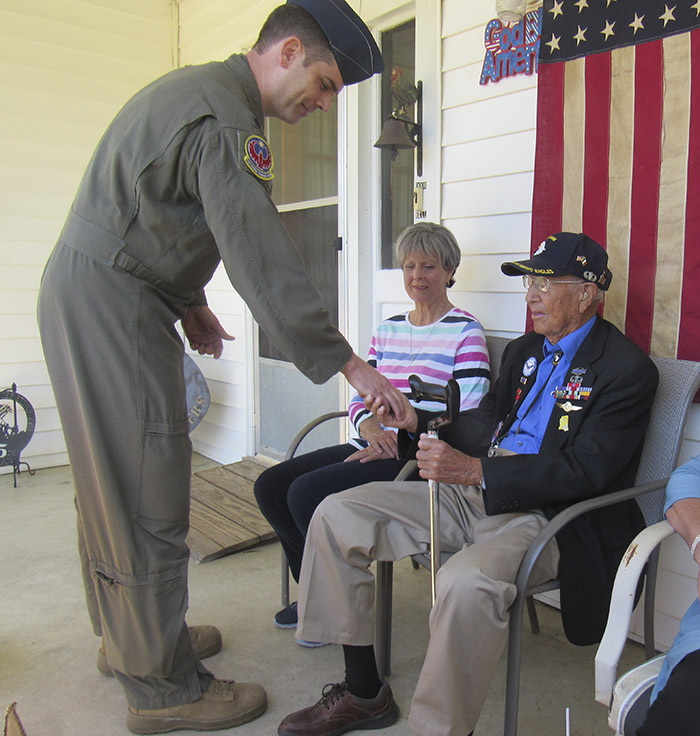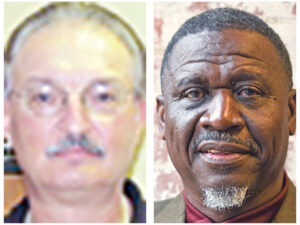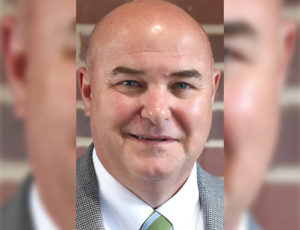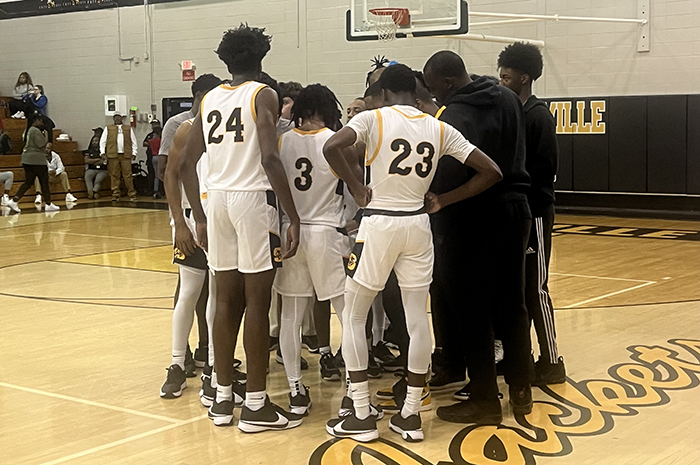Private Brad Freeman came home to Caledonia from World War II, went to college on the G.I. Bill, got married, built a home, raised two daughters and, for 32 years, worked as a rural letter carrier until he retired.
Until about 20 years ago, he was best remembered among his neighbors as the friendly guy who delivered the mail.
But fame keeps finding Freeman. Every few years, it seems, Freeman’s story is discovered anew.
Friday was such a day.
Freeman, 96, sat on his front porch, quietly taking in a program in his honor. He accepted a framed autographed photo and note, along with a challenge coin from U.S. Army Gen. Mark Milley, chairman of the Joint Chiefs of Staff — the highest ranking officer in the U.S. military honoring a serviceman of one of the lowest ranks.
Freeman also received a plaque from Rep. Trent Kelly’s office containing a resolution from the U.S. House of Representatives honoring Freeman’s service, along with the U.S. flag that flew over the Capitol on the day it was read into the Congressional Record on April 26.
Freeman was a private first class and “mortar man” in the Army, serving in the European theater in the last climatic year of the war.
He might have lived out his life in relative obscurity had it not been for the 2001 HBO miniseries “Band of Brothers,” based on the book of the same title by Stephen Ambrose published in 1992.
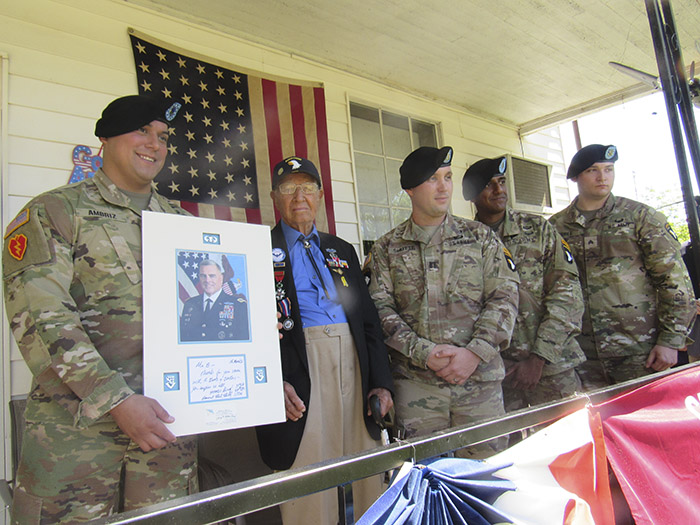
‘Easy Company’
Freeman served in the Company E (Easy Company), 2nd Battalion, 506 Parachute Infantry Regiment (PIR), 101st Airborne Division, one of the most celebrated outfits in American military history.
For those unfamiliar with the story, the exploits of Easy Company seem like a plot device used in an historical novel. At every dramatic event in the war’s final year, Easy Company and Freeman were thrust into the heart of the action — from Normandy (the Allies’ invasion of Europe on June 6, 1944) to the Netherlands (Operation Market Garden, immortalized in the book and film “A Bridge Too Far”) to Bastogne (The Battle of the Bulge) and, at the war’s end, the triumphant occupation of The Kehlsteinhaus (Hitler’s lavish compound located high in the German Alps and known as the Eagle’s Nest).
For the past 20 years, Freeman’s quiet life has been interrupted at intervals by fame and all it entails. He was awarded The French Legion of Honor, the country’s highest military honor, in 2016 and returned to France for the 75th anniversary of D-Day in 2019. During his return to France, Freeman led a “Band of Brothers” tour that followed Easy Company’s dramatic path through Europe, amazing fellow tour members with his uncanny memory of his experiences.
“Seventy-five years later, he walked a mile-and-a-half through the woods, straight to his foxhole in Bastogne,” recalled Lt. Col. (ret.) Richard Gasperin, who was part of the tour.
Milley responds to Freeman’s story
Earlier this year, Gasperin was invited to a small dinner party where Milley was one of the guests. Aware that Milley had once served as deputy commander of the 101st, Gasperin thought the general might consent to autographing a photo for Freeman.
Gasperin had not counted on Milley’s response. Milley not only signed a photo, but wrote a note, then reached into his pocket and retrieved a challenge coin minted for the Chief of Staff. Challenge coins are part of a long military tradition and are presented to recognize a bond between giver and receiver or to enhance morale.
Friday’s ceremony was organized to present those items to Freeman on Milley’s behalf.
Four members of Easy Company attended the ceremony, including former company commander, Capt. Zac Shutte, who learned of Freeman’s story from another Easy Company member from Caledonia, Phil Coggins. Coggins approached Shutte just after he had taken command in 2017.
“He said, ‘You’re not going to believe this, but I live down the road from a World War II veteran who was in the Band of Brothers,’” Shutte said. “My palms started getting sweaty and I thought, ‘How did I miss that?’”
At the time, Shutte quickly organized a ceremony for Freeman at company headquarters in Fort Campbell, Kentucky, arranging an impressive display of military equipment, including ”all the new gadgets,” to greet Freeman’s arrival.
But it was a 60-millimeter mortar tube that immediately captured Freeman’s attention.
“At the time, Mr. Freeman is 73 years removed from his service, but he sees that mortar tube and I challenge anyone here today to get between him and that mortar tube,” Shutte said. “He’ll walk up over the front of you and right down your back to get to that tube.”
Shutte said Freeman immediately began inspecting the mortar tube, running his hands over the equipment.
“Then he looked down and said, ‘Where’s the sight?’” Shutte recalled.
“Now, if you know anything about mortars, you know that the sight is the holy of the holies,” he continued. “It has to be protected. The senior mortar man keeps it. So I turned to the senior mortar man and said, ‘Where’s the sight?’ and he goes, ‘Oh, s—t, sir! It’s in the arms room.’ I said, ‘Well, go get it.’”
When the sight was retrieved, Freeman seemed satisfied, Shutte said.
“He says to us, ‘Boys, when you have this, everything is a target,’” Shutte said. “And that’s absolutely true. When infantrymen are in trouble, we always ask for that indirect fire to get us out of it.”
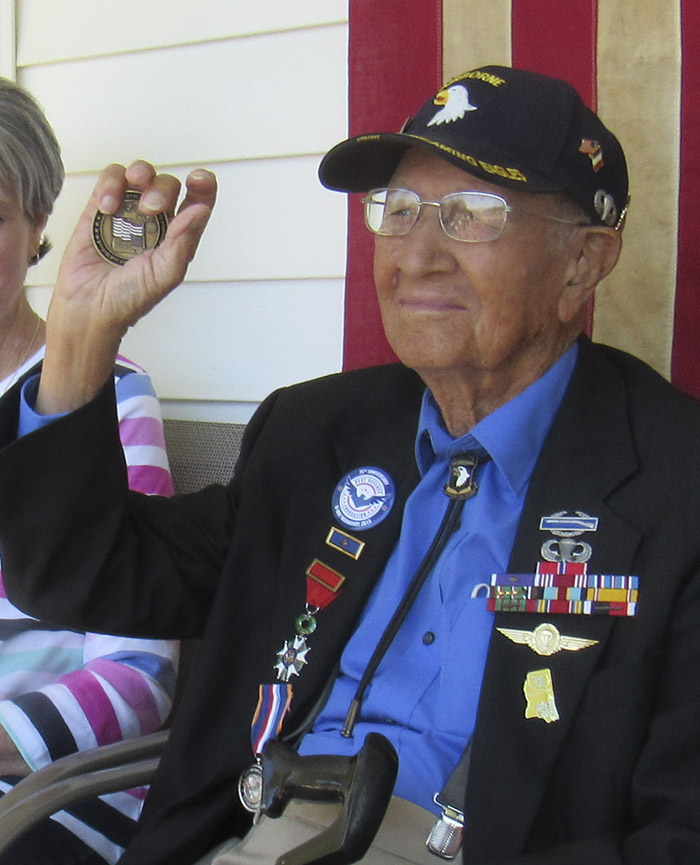
Humble hero
About an hour into Friday’s ceremony — and after Freeman received the note and the challenge coin — Freeman slowly rose from his seat on his porch and briefly addressed the crowd of about 100 people.
As always, he expressed his appreciation while understating his service.
“I don’t know how to say anything about this,” he said. “This is a surprise to me. I don’t know how to tell you how I appreciate it, but I didn’t do anything that I wasn’t (expected) to do. I just listened to my officer and (did) what he said. That’s the only reason I’m here today.”
Don Clardy, Freeman’s son-in-law, said he wasn’t surprised at the humility with which Freeman accepted this latest honor.
Noting that Freeman still lives independently, raises a small garden and bush-hogs his property, Clardy said he’s sure the attention lavished on him won’t swell his ego. It never has, after all.
“He’ll probably be out there bush-hogging this afternoon,” Clardy said. ”That’s just the way he’s always been.”
Slim Smith is a columnist and feature writer for The Dispatch. His email address is [email protected].
You can help your community
Quality, in-depth journalism is essential to a healthy community. The Dispatch brings you the most complete reporting and insightful commentary in the Golden Triangle, but we need your help to continue our efforts. In the past week, our reporters have posted 45 articles to cdispatch.com. Please consider subscribing to our website for only $2.30 per week to help support local journalism and our community.

